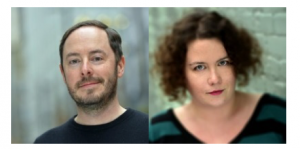Creative Commons UK was launched during Open Access Week at a CREATe Public Lecture held on 26 October 2016.
On Wednesday the 26th of October at the Humanities Lecture Theatre of the University of Glasgow, Gwen Franck and Timothy Vollmer, respectively Manager of Public Policy and European Regional Coordinator of Creative Commons, delivered a public lecture on the spirit and purposes of Creative Commons. A summary of the event and the event slides are now available.
The event was part of the CREATe Public Lecture Series and held during the celebrations of the Open Access Week to inaugurate the new Creative Commons UK affiliate team.

Timothy Vollmer, Manager Public Policy, Creative Commons and Gwen Franck, European Regional Coordinator, Creative Commons.
The talk substantively explored the main features of Creative Commons as a global and non-profit organisation that now exists in 85 countries with expert teams of staff and passionate volunteers, guiding the audience in an interesting recap of its expansion over the past fifteen years. Currently, it develops and curates six licenses and two public domain tools. The licenses are built around a block of four main features: attribution, share-alike, non-commercial and non-derivative. Each of these licenses indicates a different degree of openness and are identified as CC-BY, CC-BY-SA, CC-BY-NC, CC-BY-ND, CC-BY- NC-SA, CC-BY-NC-ND. The tools, instead, are the Public Domain Mark (PDM) and CC-ZERO (meaning “no rights reserved” as opposed to the “all rights reserved” that traditionally features copyright). While the former is an instrument to make the users aware that a work is not copyrightable or that its copyright has expired, the latter allows the copyright holder to relinquish all rights in the work or other subject matter.
Creative Commons, which the speakers described as unquestionably being “one of the main open access facilitators”, aims at developing the technical tools that promote and allow openness at different levels, not only with regard to the copyright realm, but indeed also being particularly active informing the world about open policy, open education and open science, open design and open hardware, thus becoming what Gwen defined as “a true advocate for a vibrant Commons”. To such an extent, it appears crucial for creators to let the public know what others might eventually do with their works without risk or fear of violating the creators’ rights.
However, as Gwen warned, CC licenses cannot be applied randomly, but should be carefully applied to works in which copyright actually subsists. Similar caution was suggested by Tim when choosing a particular license for a given work, for which he first advised use of the Creative Commons platform, specifically the CC search interface, that guides users according to their preferences, e.g., in terms of whether they want to allow adaptations or even commercial use of their work. In addition, other platforms such as Flickr among the most popular have integrated into their structure CC licensing agreements, which eases and makes almost straightforward such selection.
Yet, despite that all the above would facilitate sharing and collaboration among creators and users who may also become new creators, there seems to be still some reluctance to purse this valuable aim on a bigger scale. On the one hand, Tim emphasised researchers may have few incentives to share, given the current system of scholarly evaluation for the purpose of promotion and tenure; on the other hand, the scholarly publishing world that we know is still largely based on commercial publishers that do not see favourably unrestricted open access to academic knowledge as this would seriously impact their current business model (as “we are overpaying [for research outputs] over and over again”, he uttered).
In this context, all very much buoyed by the consolidated power of traditional publishers, Creative Commons is facing multiple challenges, one being to “build and reward a culture of sharing and collaboration” and another being to explore new areas of research and foster new uses of work, such as text and data mining (TDM), that are currently inhibited by the strict boundaries of copyright, but which could on the contrary greatly benefit from a legal and policy framework that supports the main purpose of science: to advance human knowledge and innovation. With this cherished objective in mind, Creative Commons offers a fundamental set of tools that enable and empower the open philosophy at the basis of the broad Open Access movement: one of the best projects we could invite to celebrate the OA week this year together with CREATe.
The slides from the event are now available. To find out more about the CREATe Public Lecture Series 2016 and to access a range of event materials, visit the dedicated page here.

